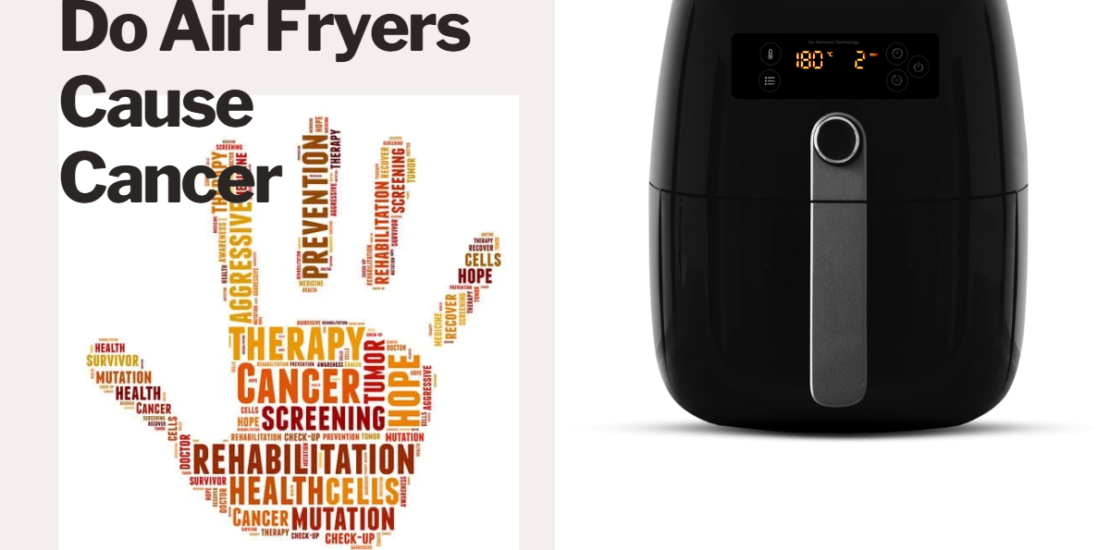Do Air Fryers Cause Cancer?
No, air fryers are not known to cause cancer on their own. This myth began as a chemical compound known as acrylamide is present when cooking with oils heated to very high temperatures.
Now that you know air fryers don’t significantly increase your cancer risk, let’s look at how this rumor came to be in the first place.
What causes air to fry?
A fine mist of oil droplets is produced by air fryers and circulates around food while being heated by surrounding air. Compared to traditional frying techniques, this way of cooking uses less oil and is more environmentally friendly. Foods produced by air frying have less fat than those made by deep-frying since it uses less oil than traditional frying. However, air frying takes at least twice as long as conventional frying because heat transfer through air is less effective than through oil.
Air frying is it healthy?
Traditional frying is frequently replaced with air frying as a healthier option. According to one study, air-fried French fries cooked for the same period of time retained 10 times less oil than deep-fried French fries. Foods that are air-fried also contain less fat and calories than conventional fried dishes.
Are air fryers cancer-causing?
Although air-frying equipment is not known to cause cancer, the act of air-frying does result in the synthesis of some substances, such as acrylamide, which have been associated to the growth of cancer. The classification of acrylamide is “probable human carcinogen.” When food is heated above 120 degrees Celsius (120°C) or 250 degrees Fahrenheit (250°F), acrylamide is produced. Acrylamide is created when food is heated as a result of a chain of chemical events (known as the “Maillard reaction”) involving the sugars and amino acids present in the food. Acrylamide is most abundant in foods high in carbohydrates such potato chips, French fries, and baked goods; but, when cooked, fish, meat, and vegetables also contain minor amounts of acrylamide.
Describe acrylamide.
Plastics, glues, and paper are all produced using the industrial chemical acrylamide. Moreover, it serves as a thickening ingredient in cosmetic items and is utilized in grout for building. It can be found in cigarette smoke. After low-level job exposure to the neurotoxic acrylamide, symptoms include trouble walking, muscle weakness, and diminished sensation in the hands and feet may appear. Moreover, acrylamide can interfere with cellular functions, DNA, and RNA, and it can potentially cause cancer in lab animals. However, there is currently no solid proof that acrylamide causes cancer in people.
Short-term exposure to acrylamide in work environments is linked to leg weakness, skin rashes and peeling, and numbness in the hands and feet. Employees who are exposed to acrylamide on a regular basis at work may experience trouble walking or other neurological issues. Although the safety of dietary acrylamide consumption in humans has also been assessed, there is still no conclusive evidence linking this substance to cancer. It is unknown how much dietary acrylamide is safe.
Arylamide is there in food?
The inclusion of acrylamide in food products was discovered for the first time in 2002. Since then, bread, crackers, chocolate-containing goods, and canned olives have all been found to contain acrylamide. It has also been found in numerous baked, fried, roasted, and toasted food kinds. Cooked foods’ toasted flavor, crusty texture, and appearance are all caused by acrylamide production. Foods with a burnt or dark crust have a higher acrylamide content than dishes with a lighter crust. The average person consumes 0.4 micrograms of acrylamide per kilogram of body weight each day, though consumption varies depending on dietary preferences.
acrylamide – is it in coffee?
Coffee beans are roasted at temperatures between 220° and 250°C (428° and 482°F), and at these temperatures, acrylamide is produced during the roasting process. Coffee species (Arabica coffee typically has a lower acrylamide content than Robusta coffee), the roasting procedure (interestingly, shorter and lighter roasts result in higher acrylamide levels), and storage time are some of the variables that affect the amount of acrylamide that is present in coffee beans (acrylamide content decreases with longer storage times). Decaffeination has no impact on coffee’s acrylamide concentration.
Do air fryers cause cancer? Before we can answer that question, it’s important to understand that many modern conveniences at some point are considered to increase your cancer risk.
Remember when you heard that excessive use of cell phones would increase your exposure to radiation? For just a little while, they were thought to increase your risk of brain cancer and brain tumor growth. There are lots of modern conveniences in our lives that have been thought to have similar drawbacks.
Are Air Fryers Toxic? – The Technical Bit
Okay, please allow me to get a little technical here. I promise, it’s only a little. When you deep fry any food you are using lots of oil that needs to be heated to very high temperatures.
Heating oil to the temperatures required for deep frying food can cause acrylamide to develop. A study by the International Agency for Research on Cancer has found that acrylamide may contribute to the development of some cancers such as ovarian, breast, pancreatic and esophageal cancer.
So, What’s Acrylamide?
Acrylamide is a chemical produced during the browning of food that is baked, fried or roasted. It’s a by-product that is created when sugars react with asparagine, an amino acid. This is called the Maillard reaction.
The level of acrylamide present in food is determined by cooking temperature, sugar content in foods, moisture, and the length of cooking time. Foods that are higher in sugar, such as potatoes, have the potential to create higher levels of acrylamide when cooked at very high temperatures.
According to the A Review of Mechanisms of Acrylamide Carcinogenicity a study conducted on rodents who were exposed to acrylamide has produced inconclusive results.
What Does all this Technical Stuff Mean?
When it comes to air fryers, you are using less oil. While the cooking temperatures may be high, often as high as deep frying, the production of acrylamide is reduced because you are using less oil and shorter cooking times. By using an air fryer, you are producing less acrylamide as opposed to deep frying which will produce considerably more of the substance.
What’s That Smell?
Some air fryer customers have complained that there’s a plastic smell when using their air fryer. Depending on the type of air fryer you have, your air fryer may have a plastic coating on some of the parts. These parts are most likely wrapped in plastic as well from packing and shipping. Be sure to remove all packing material before you use your new air fryer.
Some air fryers will smell of plastic but the plastic smell should subside with use. If the smell doesn’t go away or gets worse, stop using your air fryer and pack it away. Then contact the manufacturer to return or exchange the product.
Also, depending on the brand of air fryer you choose, some companies coat their non-stick surfaces with a Teflon style spray. This helps food not stick to your cooking basket and other surfaces, but may result in a chemical or plastic smell the first few times you use your new unit. Ater using your new air fryer a few times, this smell should go away.
Always remember that there’s a difference between a new plastic smell and a burnt plastic smell. If the smell doesn’t go away or gets worse, you should take a moment to ensure your air fryer doesn’t just need a good ol’ fashioned scrubbing.
The Basics of Cleaning Your Air Fryer
To keep your air fryer working at peak performance, it’s important to keep all the parts of your air fryer clean. So, it goes without saying that you should always scrub down your air fryer before you even use it once. How can you do this? Well, it may be simpler than you think.
Parts like the basket, grill rack and pan can be cleaned using dish soap and warm water. Just check the instruction manual included with your new air fryer for proper cleaning instructions.
You should also get in the habit of cleaning your air fryer immediately after each use. Check inside the fryer to make sure that there’s no burned food on the heating element as well. After you’ve removed the parts, check inside to ensure that no food remains. For more information on how to clean your air fryer, click here.
Will Air Fryers Make You Sick?
As with any type of cooking, baking or frying, certain precautions need to be taken to make sure your food is cooked properly. Your risks of getting sick from food cooked in an air fryer are the same as if you cook your food in your oven.
Here are some steps to take to make sure you don’t get sick from your air fryer:
- Make sure all parts are clean before each use
- Clean all parts thoroughly after each use
- Be sure to check the heating element and the inside of your fryer for any residual food splatter
- Always preheat your fryer
- Cook all foods at the recommended temperature and for the recommended time
Salmonella and E-Coli
Never put raw meat in an air fryer. Raw meat tends to be pretty wet and you shouldn’t put wet food or batters in your air fryer. Another more important reason is that air fryers cook at very high temperatures for shorter periods of time. This means that your meat might be cooked on the outside but raw on the inside. Same goes for raw eggs. A perfect environment for Salmonella and E-Coli!
As long as you follow the instructions and keep your air fryer clean, your risk of getting sick from your air fryer is very small.
Do Air Fryers Give Off Radiation?
This is a common misconception about air fryers. Air fryers are not like microwaves. They do not produce electromagnetic radiation. Food is cooked using a heating element that radiates heat inside the fryer. The heating element inside an air fryer looks very similar to the heating element for a stove.
This also means that your air fryer can get pretty warm but should still be safe to touch.
Can You Use Aluminum Foil in an Air Fryer?
Believe it or not, yes you can! Now there’s a little hitch here. Don’t put foil in your fryer on its own. The circulating air can cause the foil to attach to the heating element and cause a fire.
Some foods are better in foil than others. For instance, baked potatoes wrapped in foil work well in an air fryer while any acidic foods can react with the foil causing it to decompose and creating a mess.
Final Thoughts
When it comes to connecting air fryers with cancer, there is no definitive conclusion from the medical community. Air fryers produce smaller amounts of acrylamide than their deep-fryer counterparts so they are definitely a healthier option than deep frying. You can’t rely on your air fryer alone to reduce fat in your diet.
The main benefit of using an air fryer is the reduced amount of oil you need to cook food and the shorter cooking times. This makes the air fryer a very convenient appliance to have.
Do you own an air fryer? What are your thoughts? Please share your experiences below. I’d love to know what you think of your air fryer.

